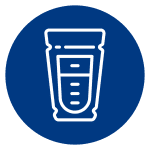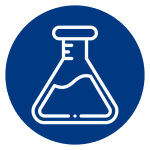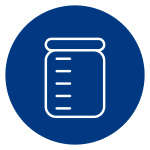Human Milk is Magic
When considering why donor human milk is so vital, the unmatched health benefits of breast milk for newborns—especially premature ones—stand out. No commercial formula can replicate the unique nutrition and immunity support that human milk provides. By donating to or receiving milk from a nonprofit milk bank, families are assured that the milk is safe, pure, and prioritized for the babies who need it most, offering them the healthiest possible start in life.
Donor human milk is essential for any baby with a weakened immune system or special dietary needs.
The American Academy of Pediatrics (AAP) claims breastfeeding and human milk (breast milk) are the gold standard optimal food for infant feeding and nutrition. While a parent’s own milk is best for their baby, the U.S. Food and Drug Administration (FDA) recommends that if, after consultation with a healthcare provider, one decides to feed their baby with human milk from another source, they should only use milk from a source that has screened its milk donors and taken other precautions to ensure the safety of its milk. In addition, the American Academy of Pediatrics supports milk banking by stating, “If mother’s own milk is unavailable despite significant lactation support, pasteurized donor milk should be used.”
The United States Breastfeeding Committee (USBC) also states, “When breastfeeding is not feasible, then human milk feeding is the recommended second choice. Banked human milk is recommended to use in medically indicated situations where there is absence or insufficient supply of mother’s own milk. The use of donor human milk has saved infant lives and positively impacted the health outcomes of countless premature and sick infants through therapy and prevention of disease, such as in metabolic disorders or allergies.”
Human milk (breast milk) is best for your baby. In addition to containing all the vitamins and nutrients your baby needs in the first six months of life, human milk is packed with disease-fighting substances that protect your baby from illness. This protection is unmatched by any formula or commercially-produced product.

“If mother’s own milk is unavailable, despite significant lactation support, pasteurized donor milk should be used.”
— American Academy of Pediatrics
How Donor Human Milk Can Help
Donor human milk provides critical nutrition in a variety of circumstances. Always consult your medical provider to determine the best course of action for you and your baby. Here are a few key ways donor human milk can help:
Hospital Care
Donor human milk is a critical source of nutrition for premature and ill infants in the hospital. Medical providers often use it in neonatal intensive care units (NICUs) to help reduce the risk of early diseases.
Initial Supplementation
For many parents, it takes a few days after giving birth for milk to come in. Donor human milk can serve as a bridge until it does, helping jumpstart a successful lactation journey.
Alternate Nutrition Source
Donor human milk is also used when a mother has undergone breast surgery, is ill, is taking certain types of medication, or has given birth to multiples and is in need of supplementation.

Mothers’ Milk Bank is committed to safety and quality. We follow the strict guidelines set forth by the Human Milk Banking Association of North America (HMBANA). All milk donors are screened by trained staff members, undergo blood testing and must have their health care providers confirm their medical histories. The milk is pasteurized in an ISO 7 clean room and goes through extensive testing before being dispensed. MMB provides donor human milk as a community service, charging only a processing fee to offset some of the costs associated with the donor screenings, milk processing and milk testing.
Our Process
At Mothers’ Milk Bank, we know that Pastuerized Donor Human Milk (PDHM) saves lives. In our cutting-edge ISO 7 Cleanroom Certified facility, we carefully collect, pasteurize, and test milk before it is sent to neonatal intensive care units throughout the country. As a member of the Human Milk Banking Association of North America (HMBANA), we adhere to strict guidelines created in accordance with the Food and Drug Administration, Centers for Disease Control and Prevention and American Academy of Pediatrics. These guidelines ensure milk is safe for all infants.
![]()
Human milk donors must complete a comprehensive screening including bloodwork to ensure their milk will be safe for babies.

Approved milk donations are pooled to ensure consistent nutrient content. Milk is then dispensed into bottles.

The milk is gently pasteurized to eliminate viruses and bacteria while preserving its unique immune properties.

After pasteurization, the milk undergoes nutritional analysis and is is tested to assure safety. It is then cooled, labeled, and frozen for storage.
![]()
Before it is shipped, a sample from each batch of processed milk is sent off to be cultured in a third-party micorbiological laboratory and must be free of bacterial growth.

After the milk is processed we ship it out to hospitals, NICUs, and families across the country.
The Benefits of Breast Milk
Ten Amazing Facts About the Magic of Human Milk
- Human milk contains critical growth factors that promote gut development.
- Human milk is remarkably consistent around the world.
- While the amount of calcium in human milk is low, 67% of it is absorbed!
- The composition of human milk changes throughout lactation to meet the nutritional needs of growing babies.
- Human milk provides short-term protection against acute illness AND long-term protection against chronic disease.
- Human milk contains undifferentiated stem cells.
- Human milk contains leptin, a hormone that regulates appetite.
- Human milk changes flavor (and color!) depending on the parent’s diet, preparing the baby for cultural flavors.
- After lactose and lipids, oligosaccharaides are the third most abundant solid in human milk.
- Human milk has critical immune factors (especially IgA antibody-90%) that provide immune protection.



